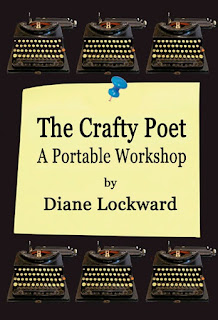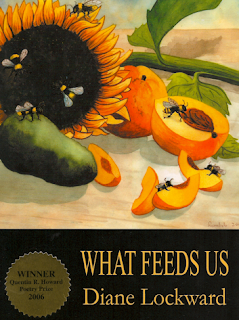
Back in 2010 I posted a piece called "What Makes for a Good Poetry Reading?" I recently took another look at that piece and decided to repost it five years later with a few additions. My experiences as both a reader and an audience member have made me well aware that readings are not created equal. Some are wonderful and some are quite the opposite. As a reader, when the reading doesn't go well, I ask myself, Why do I continue to do this? But when it does go well, I know why I keep doing it. Because it's fun and feels great. Fortunately, it goes well more often than it doesn't. In the hope of enhancing the likelihood of more good readings, I'm reposting some thoughts on the the role of the host, the poet, and the audience on how they can each contribute towards a successful reading.
The Host's Role
1. Good PR is essential. If no one knows about the reading, you can be sure no one will be there. If you're the host, you're obligated to spread the word as widely as you can. Even if the reading is part of a regular series, you should PR each reading as if it's special (because to the poet it is). Posters, newspaper notices, online calendars, websites, blogs, email lists. It's really disheartening for the poet to arrive and learn that the host never got around to promoting the event. No excuses, Host.
2. Try to make the room comfortable. Arrive early to check the room temperature and the mic if there is one. Arrange the chairs so that the audience is neither too close to nor too far from the poet. If all the people gravitate to the back of the room, threaten them until they move to the front. Likewise, if half sit on the far right and half sit on the far left, ask people to move in a bit. These little things make a big difference in the comfort level of the reading.
3. If possible, provide a good sound system unless the room is small. Don't expect the poet to shout her poems. I gave a reading a few years ago in a coffee shop that had no mic. Coffee machines, chimes on the door, change rattling. Not so cool.
4. Be sure you provide a space for the poet's books to be displayed. Announce to the audience that books are available. If they're at a sale price, mention that. Repeat that. Do your best to help the poet sell some books, especially if your honorarium is small or non-existent. Don't make the poet hawk her own wares. If possible, provide someone to handle sales and make change.
5. This is going to sound cranky, but I'm saying it anyhow. Don't allow audience members to put out their own books for sale. And don't put out your own books. Just don't create competition for your visiting poet, especially if the poet has traveled a distance. Double especially if pay is minimal or non-existent.
6. If you can't offer an honorarium, consider putting out a basket. I did a reading some months ago where such a basket was put out, but guess what! The host kept everything that went into it. I'd driven five hours and paid for a hotel.
7. If there's an Open, manage it. Manage it. Have guidelines and enforce them. Many a reading has been spoiled by an Open that got out of hand and went on endlessly. When this happens, some audience members are discouraged from returning and you end up with an audience of open readers who are there to hear themselves. A well-run Open can, however, be fun. Limit the readers to one or two poems. That's it. No negotiating. Got a haiku? That's one poem. Even if there are only two people reading in the Open, do not allow more than two poems each.
8. Anyone who arrives after the featured poet has finished reading should not be allowed to read in the Open. No exceptions. Something about good manners.
The Poet's Role
1. You can help with the PR. Post the reading at your website and blog and anywhere else you can think of. In addition to the preceding, notify people you know in the area that you'll be doing a reading and ask them to bring friends.
2. If the host neglects to put out your books, rectify that right away! I'm putting an exclamation point on that sentence because I have done a few readings where the host forgot about books and I was too timid to bring it up. Then I kicked myself all the way home. Now if the host doesn't ask for my books, I ask, "Where would you like me to put my books?"
3. If the host fails to announce that your books are available for sale and signing, then do that yourself. Don't browbeat the audience into buying your books—that's really unappealing—but you can mention once at the beginning and/or at the end that your books are on the table and offered tonight at discount and that you'll be happy to sign them.
4. Go prepared. Choose your poems before you arrive. I've heard a number of poets say they have to gauge the audience before they choose. Nonsense. That's just laziness. It's annoying and a waste of time for the audience to sit there while the poet fumbles through pages looking for what to read.
5. Time your reading ahead of time. You know how many poems will take up 30 minutes. Plan for that if that's the amount of time you have. Don't go beyond the time. Ever. And don't keep asking the host, How am I doing for time? How much time do I have left? Time for a few more poems? This makes the audience squirm. And if you've said, as you reach the end of your time, that you're going to read just two more, then read just two more. Don't toss in a third, no matter how much the audience seems to like you.
6. Try to stay for the Open. If people came to hear you, it seems polite to stay to hear them. If you're driving a distance and have to leave, let the audience know that that's why you're leaving.
7. Email a thank-you to your host, even if the turnout was disappointing. There are times when competing events or weather keep people away. Let the host know that you appreciate the invitation to read in her series. If the reading was a big hit, let your host know that you appreciate his efforts to put together a great event.
The Audience's Role
1. If you're in the audience and planning to read during the Open, please do not work on your own poem while the featured poet is reading. It's incredibly rude.
2. Do not give long preambles to your poem. Just read the poem.
3. Don't make announcements from the podium, especially ones about your own upcoming readings.
4. Do not stare at the featured poet while you're reading your poem. Read for the whole room.
5. If you possibly can, support the poet with the purchase of a book. It means a lot to the poet. Really.
6. Do not ever, and I mean ever, suggest a book trade to the featured poet. This is beyond rude and it makes for a very uncomfortable situation.








